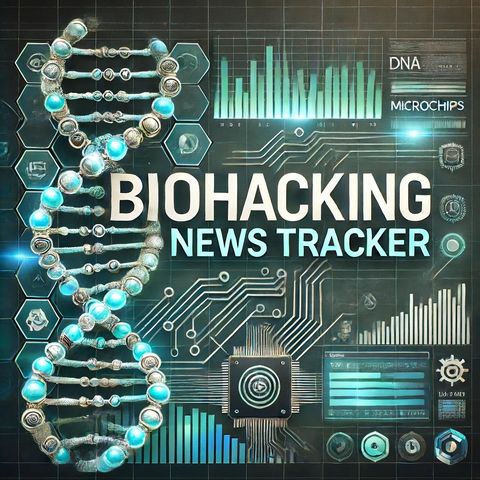Biohacking: The Democratization of Science and Personal Health Autonomy
Sep 5, 2024 ·
3m 21s

Download and listen anywhere
Download your favorite episodes and enjoy them, wherever you are! Sign up or log in now to access offline listening.
Description
Biohacking, a term that arose in the late 20th century from the world of technology and hacking, involves applying the hacker ethic of decentralized knowledge to biology. It's about taking...
show more
Biohacking, a term that arose in the late 20th century from the world of technology and hacking, involves applying the hacker ethic of decentralized knowledge to biology. It's about taking control of one’s own biology using a combination of medical, nutritional, electronic, and physical techniques. This practice has grown into a diverse and sprawling movement encompassing a wide range of activities, from simple dietary changes to profound genetic edits.
Biohackers, often referred to as grinders or DIY biologists, embrace a wide spectrum of practices. Some focus on nutrigenomics, which examines the interaction between nutrition and genes to tailor personalized diets that optimize health. Others develop devices to augment human capabilities, such as implantable chips that can monitor and influence bodily functions or provide sensory enhancements.
The range of biohacking extends to experimenting with gene editing technologies like CRISPR. CRISPR, which stands for Clustered Regularly Interspaced Short Palindromic Repeats, has been used by biohackers to modify organisms' genetics, including their own, in less formal settings than traditional labs. Though this invites significant ethical and safety debates, it highlights the biohacking community's role in democratizing science and technology.
Josiah Zayner, a former NASA biochemist who famously injected himself with CRISPR DNA at a biotech conference in 2017, symbolizes one extreme of this spectrum. His actions sparked controversy and brought significant attention to the practice, raising questions about the risks associated with self-experimentation in biohacking.
Beyond genetic modification, biohackers also employ a variety of gadgets and lifestyle hacks aimed at enhancing the body's function. Techniques such as intermittent fasting, extreme temperature exposure, heart rate variability training, and the use of nootropics—substances that can enhance cognitive function—are all parts of the biohacker’s toolkit.
The community is varied, with some practitioners focusing on extending life, improving physical performance, or enhancing cognitive abilities, while others aim at merely optimizing their health through data obtained from biometric devices. Biohackers often share their findings and methods through online forums, blogs, and conferences, promoting an open-source ethos that challenges the conventional boundaries of scientific research and pharmaceutical development.
This movement isn't without criticism, however. The medical and scientific communities often express concerns over the safety and ethics of unregulated biohacking activities. Issues such as potential harm from untested therapies, privacy concerning personal biometric data, and the implications of gene editing are at the forefront of discussions about responsible innovation.
Despite these concerns, biohacking continues to grow, driven by a combination of curiosity, self-improvement goals, and disillusionment with traditional healthcare's limitations. It represents a unique intersection of technology, science, and personal health autonomy, reflecting broader societal shifts toward individual empowerment and participatory medicine.
show less
Biohackers, often referred to as grinders or DIY biologists, embrace a wide spectrum of practices. Some focus on nutrigenomics, which examines the interaction between nutrition and genes to tailor personalized diets that optimize health. Others develop devices to augment human capabilities, such as implantable chips that can monitor and influence bodily functions or provide sensory enhancements.
The range of biohacking extends to experimenting with gene editing technologies like CRISPR. CRISPR, which stands for Clustered Regularly Interspaced Short Palindromic Repeats, has been used by biohackers to modify organisms' genetics, including their own, in less formal settings than traditional labs. Though this invites significant ethical and safety debates, it highlights the biohacking community's role in democratizing science and technology.
Josiah Zayner, a former NASA biochemist who famously injected himself with CRISPR DNA at a biotech conference in 2017, symbolizes one extreme of this spectrum. His actions sparked controversy and brought significant attention to the practice, raising questions about the risks associated with self-experimentation in biohacking.
Beyond genetic modification, biohackers also employ a variety of gadgets and lifestyle hacks aimed at enhancing the body's function. Techniques such as intermittent fasting, extreme temperature exposure, heart rate variability training, and the use of nootropics—substances that can enhance cognitive function—are all parts of the biohacker’s toolkit.
The community is varied, with some practitioners focusing on extending life, improving physical performance, or enhancing cognitive abilities, while others aim at merely optimizing their health through data obtained from biometric devices. Biohackers often share their findings and methods through online forums, blogs, and conferences, promoting an open-source ethos that challenges the conventional boundaries of scientific research and pharmaceutical development.
This movement isn't without criticism, however. The medical and scientific communities often express concerns over the safety and ethics of unregulated biohacking activities. Issues such as potential harm from untested therapies, privacy concerning personal biometric data, and the implications of gene editing are at the forefront of discussions about responsible innovation.
Despite these concerns, biohacking continues to grow, driven by a combination of curiosity, self-improvement goals, and disillusionment with traditional healthcare's limitations. It represents a unique intersection of technology, science, and personal health autonomy, reflecting broader societal shifts toward individual empowerment and participatory medicine.
Information
| Author | QP-4 |
| Organization | William Corbin |
| Website | - |
| Tags |
Copyright 2024 - Spreaker Inc. an iHeartMedia Company
